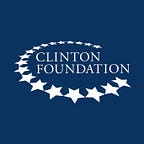Clinton Health Access Initiative: 10 Years of Transformation
On Friday, July 27, 2012, President Clinton spoke at the International AIDS Conference and discussed how much progress has been made in providing treatment for HIV/AIDS. Read about how the Clinton Health Access Initiative has been helping address the HIV/AIDS crisis over the past 10 years.
While delivering keynote remarks along with Nelson Mandela at the 2002 International AIDS Conference in Barcelona, President Clinton was asked by several heads of state to address the HIV/AIDS crisis unfolding in the Caribbean. At Nelson Mandela’s urging, President Clinton began the Clinton Foundation’s HIV/AIDS Initiative, now the Clinton Health Access Initiative (CHAI).
In 2002, when CHAI began its work, only 200,000 people in the developing world were on treatment for HIV/AIDS, and medicines were costing governments over $10,000 per person per year. CHAI negotiated with drug manufactures to lower the cost of key medicines and simultaneously worked with developing country governments to strengthen their health systems and increase access to treatment — and ultimately transformed the market for these medicines from a high-cost, low-volume model to one that is low-cost and high-volume. Through all of this work, CHAI’s goal was to build systems of care that governments could eventually maintain on their own, without foreign support.
CHAI began quickly to make an impact by rapidly scaling up antiretroviral treatment for adults. Then, in 2005, CHAI began developing programs to increase pediatric HIV treatment in 12 countries. At that time, only one out of 40 children had access to HIV treatment in the developing world. CHAI established specialized care systems and lowered the price of pediatric treatments by as much as 80–92 percent; CHAI has also reduced the price of pediatric regimens from $745 in 2006 to $103 in 2010 — an 87 percent reduction.
Building on its work to scale up HIV testing and treatment for children, in 2008 CHAI began to focus on a comprehensive approach to reduce HIV transmission between mothers and their children in Cambodia, Ethiopia, Lesotho, Malawi, Tanzania, and Vietnam. It is estimated that over 1,000 children become infected with HIV daily and that 90 percent of new infections in children are due to mother-to-child transmission. CHAI’s prevention programs have reduced HIV transmission by 40 percent through pre-natal and post-natal care, testing, and treatment.
CHAI has taken this uniquely successful business-oriented approach and expanded it to increase access to treatments for malaria and tuberculosis — treatments that are often affordable but unavailable — as well as to accelerate the rollout of new vaccines. CHAI has recently assisted in the rollout of the new vaccine for pneumonia — the pneumococcal vaccine — which will save the lives of 23,000 children in the next two years, and the vaccine for diarrhea — the rotavirus vaccine — which will save the global community about $500 million over the next five years.
In addition to increasing access to lifesaving medicines, CHAI works at the invitation of governments to strengthen in-country health systems by improving hospitals, laboratories, clinics, and other health facilities. CHAI has recently launched a new model for health education to address the lack of trained doctors and nurses in Rwanda through cooperative partnerships with U.S. academic institutions. This goal of this program is to ensure that Rwanda has a long-term, sustainable source of human resources for health — and isn’t reliant on foreign doctors or aid.
CHAI’s success is evident in its numbers. In 10 years, 4 million people in more than 70 countries, including 340,000 children in 34 countries, are benefiting from CHAI’s price negotiations. CHAI has reduced the cost of HIV treatment by up to 90 percent and HIV diagnostics by up to 80 percent and has saved developing countries $1 billion in treatment costs since 2007.
In 10 years, we’ve come a long way in the fight against HIV/AIDS and other infectious diseases. But we know there is still much to be done. CHAI will continue to work with governments and partners to address inefficiencies in health systems and help more people receive the lifesaving treatment they need.
